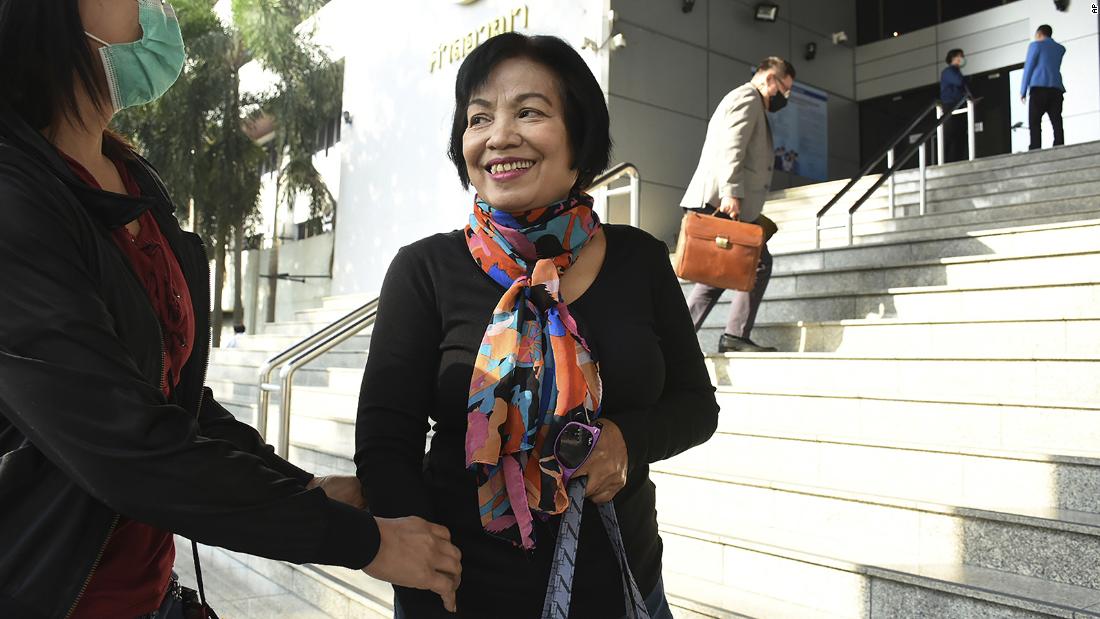Thailand has some of the strictest laws in the world against defaming or criticizing the king, queen, heir apparent or ruler. The laws, known as lese majeste, can result in a 15-year prison sentence for each violation.
Anchan Preelert, 65, pleaded guilty to sharing audio clips on YouTube and Facebook between 2014 and 2015 that were considered critical of the kingdom’s royal family, according to Thai Lawyers for Human Rights. She was convicted of 29 charges, with three years each.
The Bangkok criminal court issued an initial 87-year sentence, but cut it in half because of Anchan’s guilty plea.
“The sentence is the highest ever issued by a Thai court for violating Section 112,” said his lawyer Pawinee Chumsri, referring to the lese majeste law.
Pawinee said he would appeal the verdict and was working to secure bail for the Court of Appeal. “There are two more courts that we can try in your legal case,” she said.
Renaissance of lese majeste
Many protesters were encouraged to openly call for reform of the monarchy.
These connections hit the nerve and took thousands of people to the streets, in sometimes violent clashes with police and pro-monarchy groups. The idea of a sacrosanct monarchy and a king protected from public scrutiny was destroyed by the younger generation. His demands included the king being held accountable under the constitution, a restriction on his powers and transparency on his finances.
From November 24 to December 31, 2020, at least 38 people were charged with lese majeste, including a minor and several university students, according to Thai Lawyers for Human Rights.
Thitinan Pongsudhirak, a political scientist and director of the Institute for Security and International Studies at Chulalongkorn University, said Anchan’s sentence “means that the lese majeste law has returned in full force.”
“As a date of the last reign and the 2014 coup, this record sentence after a hiatus is seen as a wake-up call for the youth-led protest movement against the new monarch,” he said. “This suggests that Thailand’s established power centers are gearing up for the long term.”
Six-year case
Anchan’s case is not directly linked to the recent charges against pro-democracy protesters. But with the nearly three-year gap in cases of lese majeste, analysts say the ruling suggests that old cases will now be activated.
Anchan, a former civil servant who worked for the Revenue Department, was arrested in January 2015, not long after the military overthrew Thailand’s civilian government in a coup.
Anchan’s case was initially brought to a military court and she was detained for nearly four years pending trial, her lawyers said. In 2018, she was released on bail and her case was transferred to a civil criminal court.
His crime was sharing audio clips on social media on an underground radio show that allegedly criticized the late King Bhumibol Adulyadej. The creator of the clips – a man who went by the name “Banpodj” – was sentenced in lese majeste and has already served his sentence.
“This shocking case is yet another serious attack on Thailand’s shrinking space for freedom of expression,” said Amnesty International’s Asia Pacific regional director, Yamini Mishra. “The way she was convicted is also frightening. The way the authorities have evidently sought to maximize punishments by multiplying criminal charges sends a clear message of deterrence to Thailand’s 50 million internet users.”
